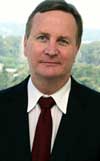
Sam Hawgood
Sam Hawgood, MB, BS, interim dean of the UCSF School of Medicine, chair of the Department of Pediatrics in the UCSF School of Medicine and physician in chief of UCSF Children’s Hospital, issued message on January 23 about the economic crisis.
Hawgood reported that he formed an ad hoc
budget work group (pdf) that will work with him to ensure that the school makes the decisions necessary to preserve the financial stability to balance its budgets, implement its plans and realize its common objectives.
Here is Hawgood’s entire message:
Dear Colleagues,
As we navigate the current economic turmoil, I want to share with you some thoughts about where we stand, how we are positioned for the future, and what steps we are taking in the School to confront and manage the challenges before us. UCSF’s stature as one of the most outstanding medical schools in the world gives us considerable advantages in these challenging times, but only if we remain cognizant of our strengths – and act with willingness to address our vulnerabilities.
As you know, the School of Medicine depends on varied revenue sources: clinical income; sponsored research; gifts and endowments; and federal, state and city funding. Each of these revenue sources has been negatively affected by the economic downturn, and these impacts will affect what we do, how we do it and when we do it. However, we can and will manage these economic effects in a manner that both maintains our momentum and establishes a foundation for future success in education, research and patient care at all of our sites.
In recent weeks, I have met with the leadership of the School and have been heartened by the commitment of the chairs and program directors to work cooperatively and collaboratively within departments and across the School to enhance our future.
We will have to make difficult decisions about resource allocation, and I ask all of you to support your department chairs or unit directors as they make tough decisions about the allocation of scarce resources. The School is fortunate to have outstanding individuals in these leadership positions, and I know they will make these difficult decisions thoughtfully and in the best interests of our programs, faculty, staff, and students. They have my full support, and I ask that you support them as well.
You have already heard directly from University President Yudof, Chancellor Bishop and Medical Center CEO Mark Laret about measures being taken system wide, at the campus level and in the Medical Center. SOM faculty and staff will play active roles in campus-wide task forces being formed. I encourage you to read the materials posted at
http://budget.ucsf.edu for more details and updates on the campus budget situation.
Within the School of Medicine, I have formed an ad hoc
budget work group (pdf) that will work with me to ensure that the School makes the decisions necessary to preserve the financial stability to balance our budgets, implement our plans and realize our common objectives. This group will meet regularly with these goals:
- supporting our departments, institutes, and programs in their financial projections, planning, and decision making;
- developing school-wide responses to the challenges we face; and
- coordinating our responses with the campus, other schools, and the medical center.
We will keep the broader School community regularly informed of this work group’s progress. Similar efforts are underway at San Francisco General Hospital and our other clinical sites, and we will work to see all our efforts are coordinated.
In Washington, both [the UC Office of the President] and the Association of American Medical Colleges are positioning us to participate in the Obama Administration’s economic stimulus program. Additional funding for health care and investment in science and technology is already making its way through Congress. In particular, I am hopeful that the National Institutes of Health will receive a significant supplement to its budget. As one of the leading medical schools in the nation, we should actively participate in these new initiatives. This will be among the key points of discussion in two weeks, when the School’s leadership meets for its annual retreat. The retreat’s overall agenda focuses on how the School can best support our faculty to achieve excellence in these challenging times. My hope is that the work at the retreat will serve as a springboard to aggressively position the School to our best advantage as stimulus initiatives and other opportunities are rolled out.
Feelings of anxiety and uncertainty are understandable in times like these, but the School of Medicine is a wonderful place because of you – our faculty, our staff, our trainees and our students. We must preserve our sense of community and collaboration and approach the challenges ahead with good will towards our colleagues and confidence in our School and campus. We will emerge from these challenges stronger than ever. I welcome your comments, questions and suggestions.
Sincerely,
Sam Hawgood
